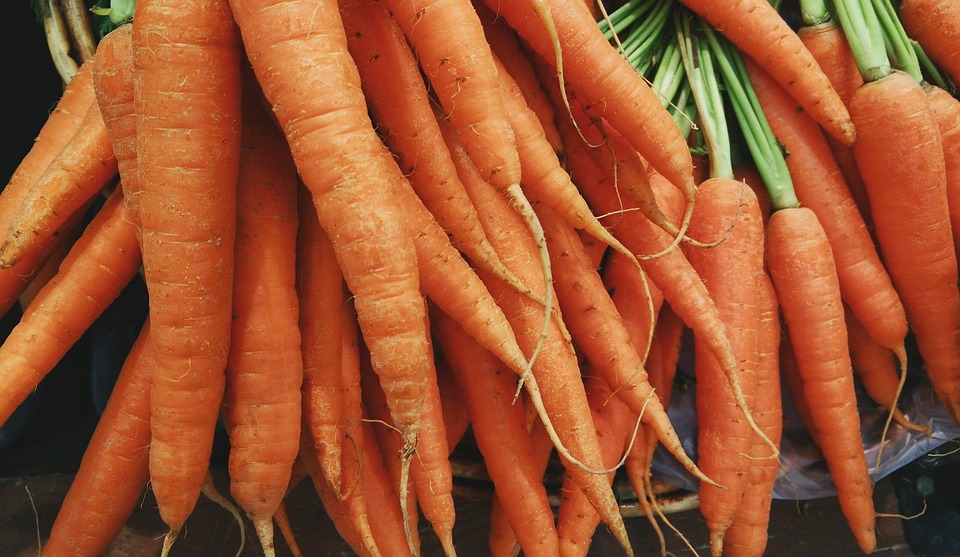This comprehensive guide delves into the world of feline nutrition, exploring whether carrots are a safe and beneficial treat for our beloved feline companions. We'll cover the nutritional benefits, potential risks, proper preparation methods, and much more, providing you with all the information you need to make informed decisions about your cat's diet.
Part 1: The Nutritional Value of Carrots

Carrots are a vibrant and nutritious vegetable that holds a special place in human diets. But can our furry friends reap the same benefits? Let's delve into the nutritional profile of carrots and assess their potential for cats.
1.1: Vitamin A: A Key Nutrient for Feline Health
Carrots are renowned for their high content of beta-carotene, a potent precursor to Vitamin A. Vitamin A plays a crucial role in maintaining healthy vision, immune function, and skin and coat condition. It's particularly important for cats as they can't synthesise Vitamin A from beta-carotene, unlike humans.
1.2: Dietary Fibre: Supporting Digestive Wellness
Carrots are a decent source of dietary fibre, which is essential for healthy digestion. Fibre helps regulate bowel movements, prevents constipation, and supports a healthy gut microbiome. However, it's crucial to remember that an excess of fibre can lead to digestive issues in cats.
1.3: Vitamin K: A Vital Component for Blood Clotting
Carrots contain a good amount of Vitamin K, which is vital for blood clotting. Vitamin K helps the body produce proteins involved in blood coagulation, preventing excessive bleeding.
1.4: Potassium: Essential for Muscle Function and Blood Pressure Regulation
Carrots are also a source of potassium, a vital mineral that helps regulate blood pressure and muscle function. Potassium plays a crucial role in nerve signal transmission, maintaining fluid balance, and supporting overall cell function.
1.5: Biotin: Promoting Healthy Skin, Coat, and Claws
Carrots contain biotin, a B-vitamin crucial for healthy skin, hair, and nails. Biotin promotes keratin production, contributing to a glossy coat and strong claws in cats.
1.6: Other Essential Nutrients
In addition to the above, carrots contain a range of other essential nutrients, including:
- Vitamin C: An antioxidant that supports immune function and helps protect cells from damage.
- Vitamin E: An antioxidant that protects cells from damage caused by free radicals.
- Magnesium: Plays a role in muscle and nerve function, and helps regulate blood sugar.
Part 2: Are Carrots Safe for Cats?

While carrots offer a range of nutritional benefits, the question of their safety for cats remains a subject of debate. Let's explore the potential benefits and risks associated with feeding carrots to your feline companion.
2.1: Potential Benefits of Carrots for Cats
- Improved Digestive Health: The fibre in carrots can aid digestion and prevent constipation, particularly in cats with a history of digestive issues. However, excessive fibre intake can lead to diarrhoea or gas.
- Oral Health: The crunchy texture of raw carrots can help clean teeth and improve oral hygiene, reducing the risk of plaque and tartar buildup. However, it's important to supervise your cat closely to prevent choking.
- Weight Management: Carrots are relatively low in calories and can be a healthy alternative to high-calorie treats. They can be incorporated into a weight management program alongside a balanced diet and exercise.
- Potential for Nutrient Boost: While cats can get Vitamin A from other sources, carrots can offer a supplementary source, particularly for cats with dietary restrictions.
2.2: Potential Risks of Carrots for Cats
- Digestive Upset: While fibre is beneficial, too much can cause digestive upset, including diarrhoea, gas, and vomiting. Always introduce carrots gradually and monitor your cat's reaction.
- Choking Hazard: Carrots, especially when raw, can pose a choking hazard for cats, particularly smaller breeds or kittens. Always cut carrots into small pieces and supervise your cat during feeding.
- Pesticide Residues: Carrots grown conventionally may contain pesticide residues, which can be harmful to cats. Opt for organic carrots whenever possible.
- Potential for Allergic Reactions: While rare, some cats may have allergies to carrots. Watch for signs such as itching, swelling, or difficulty breathing and consult your veterinarian if you suspect an allergy.
Part 3: Can Cats Eat Carrots in Every Form?

The way carrots are prepared can significantly impact their safety and digestibility for cats. Let's explore the different forms of carrots and their suitability for feline consumption.
3.1: Raw Carrots
Raw carrots are crunchy and can provide a satisfying chew for cats. However, their tough texture can pose a choking hazard, especially for smaller cats. It's best to offer raw carrots in small pieces, under supervision.
3.2: Cooked Carrots: A Safer Option
Cooking carrots softens their texture, making them easier to digest and less likely to cause choking. However, overcooking can deplete some of their nutritional value. Steaming or lightly boiling carrots is recommended to retain more nutrients.
3.3: Carrot Juice: Not Recommended
Carrot juice is a concentrated source of nutrients, but it's not recommended for cats. It lacks fibre and can cause digestive upset. The high sugar content can also be detrimental to feline health.
3.4: Carrot Baby Food: A Convenient Option
Carrot baby food can be a safe and palatable option for cats, as it's already pureed and gentle on their digestive system.
Part 4: How to Safely Introduce Carrots to Your Cat
Introducing new foods to your cat's diet should be done gradually and with caution. Here's a step-by-step guide to safely introducing carrots to your feline companion:
4.1: Start Small
Offer a tiny piece of cooked or raw carrot, no larger than a pea, and observe your cat's reaction.
4.2: Monitor for Signs of Digestive Upset
If your cat exhibits any signs of digestive upset, such as diarrhoea, vomiting, or gas, stop feeding carrots and consult your veterinarian.
4.3: Gradual Increase
If your cat tolerates the initial introduction, gradually increase the amount of carrots you offer over several days or weeks.
4.4: Consider Variety
Offer carrots in different forms, such as cooked, raw, or baby food, to see which your cat prefers.
Part 5: How Much Carrot Should You Feed Your Cat?
While carrots can be a healthy treat, they should only be given in moderation. The amount of carrots you feed your cat will depend on their size, age, activity level, and overall diet.
5.1: General Guidelines
A good rule of thumb is to limit carrots to no more than 10% of your cat's daily calorie intake. This ensures that carrots don't displace essential nutrients from their regular food.
5.2: Consult Your Veterinarian
It's always best to consult with your veterinarian for personalized recommendations on how much and how often to feed your cat carrots. They can advise you based on your cat's specific needs and health status.
Part 6: Alternatives to Carrots for Cats
While carrots can be a healthy snack option, they're not the only suitable vegetable for cats. Here are some alternatives to consider:
- Green Beans: Green beans are a low-calorie, fibre-rich option that's safe for cats. Offer them cooked or raw, but always cut them into small pieces.
- Broccoli: Broccoli offers a range of nutrients, including vitamin C and potassium, and can be safely enjoyed by cats in moderation. Cook it until tender and avoid the stems.
- Sweet Potato: Cooked sweet potato is a good source of vitamin A and fibre, but should be given in moderation. Ensure it's cooked thoroughly and cooled down before feeding to your cat.
- Pumpkin: Pumpkin is a good source of fibre and can help with digestion. Offer it cooked and pureed, or use canned pumpkin that's specifically formulated for pets.
- Zucchini: Zucchini is a low-calorie, hydrating option that's safe for cats. Offer it cooked or raw, but always cut it into small pieces.
Part 7: Things to Avoid When Feeding Carrots to Your Cat
When feeding your cat carrots, it's important to be mindful of certain factors that could compromise their safety and well-being:
7.1: Avoid Feeding Carrots with Salt or Sugar
Salt and sugar are harmful to cats and should never be added to their diet.
7.2: Avoid Giving Carrot Tops
Carrot tops contain a toxic compound that can cause digestive upset and other health problems in cats.
7.3: Ensure Carrots are Thoroughly Cleaned
Always wash carrots thoroughly to remove any dirt, pesticides, or bacteria.
7.4: Avoid Overfeeding
While carrots can be beneficial, overfeeding can lead to digestive upset or weight gain. Stick to the recommended portion size and monitor your cat's weight.
Part 8: FAQs
Here are some frequently asked questions about feeding carrots to cats:
8.1: Can kittens eat carrots?
Kittens should be introduced to carrots with caution, as their digestive systems are still developing. Offer small pieces of cooked carrots, and monitor their reaction closely. It's always best to consult your veterinarian before introducing new foods to kittens.
8.2: Can cats be allergic to carrots?
While rare, some cats may have allergies to carrots. If you notice any signs of an allergic reaction, such as itching, swelling, or difficulty breathing, stop feeding carrots and consult your veterinarian.
8.3: Can I give my cat raw carrots?
Raw carrots can be a healthy treat, but it's essential to offer them in small pieces and supervise your cat closely to prevent choking.
8.4: Are baby carrots safe for cats?
Baby carrots are safe for cats, but it's essential to cut them into small pieces to prevent choking.
8.5: Can cats eat carrot cake?
Carrot cake contains ingredients that are harmful to cats, such as sugar, milk, and nuts. It's best to avoid feeding carrot cake to your feline companion.
8.6: Can cats eat carrot sticks?
Carrot sticks are safe for cats, but it's essential to cut them into small pieces and supervise your cat closely to prevent choking.
Conclusion
While carrots offer potential nutritional benefits for cats, it's essential to approach their inclusion in your feline companion's diet with caution and moderation. Consult with your veterinarian for personalized recommendations based on your cat's individual needs. By following the guidelines outlined in this guide, you can help ensure that your cat enjoys the occasional carrot treat safely and healthily.
Everyone is watching
-

Are Cat Ribs Flexible? Understanding Their Anatomy
CATS & KITTENSThis article delves into the fascinating world of feline anatomy, exploring the flexibility of cat ribs and ho...
-

Can Cats Eat Bananas? (Everything You Need to Know)
CATS & KITTENSThis article dives into the intriguing question of whether cats can safely enjoy the sweet, yellow fruit, bana...
-

Cat Lifespan: How Long Do Cats Live?
CATS & KITTENSThis comprehensive guide explores the factors influencing the lifespan of our feline companions, providing ins...
-

Can Cats Get COVID-19? What You Need to Know
CATS & KITTENSThis article will delve into the fascinating world of feline COVID-19 susceptibility. We'll explore whether ca...
-

Can Cats Eat Eggs? A Complete Guide to Egg Safety for Your Feline Friend
CATS & KITTENSWhen it comes to treating our furry companions, we all want to ensure we're doing what's best for them. Eggs...
